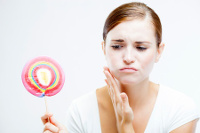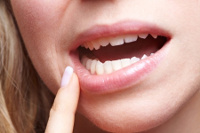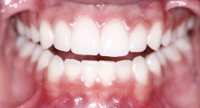Foods to Avoid if You Have Sensitive Teeth
February 12th, 2015
 Sensitive teeth can be caused by a number of issues including an exposed nerve, a fractured or worn tooth, and receding gums. While visiting a dentist is the best way to prevent most of these issues, you can avoid the pain that is associated with sensitive teeth by limiting certain foods and drinks. Here are the most common types of food that can agitate your teeth and cause a lot of pain.
Sensitive teeth can be caused by a number of issues including an exposed nerve, a fractured or worn tooth, and receding gums. While visiting a dentist is the best way to prevent most of these issues, you can avoid the pain that is associated with sensitive teeth by limiting certain foods and drinks. Here are the most common types of food that can agitate your teeth and cause a lot of pain.
Foods To Avoid If You Have Sensitive Teeth:
Hot and Cold Food
Many of the foods that can cause pain to sensitive teeth are not caused by the specific food but by the temperature of the food. Extremely cold or hot foods can cause pain on the fractured tooth or teeth. Ice cream and cold drinks can cause pain, but the worst is chewing ice. Hot coffee and tea along with hot soup are warmer foods and drinks that can cause sensitive teeth to be aggravated. The best solution is to avoid these types of food and opt for meals with less extreme temperatures.
Acidic Food
Acidic foods such as citrus fruits, like lemons and oranges, along with vinegar-based foods, like pickles and olives, can often cause sensitive teeth and can make the pain that comes along with sensitive teeth worse. Acidic foods wear away at the enamel of the tooth which can make the problem worse.
Sugary Candies
Most kinds of candy will cause discomfort for sensitive teeth. Hard candies such as suckers and peppermints, which people tend to bite down on, can create further damage to your teeth along with causing strong pains. Furthermore, chewy candies such as gummy bears and licorice can get stuck inside open cavities and under gums, which will cause discomfort.
While certain foods can cause pain to your teeth, there are other foods that can help relieve discomfort.
Food That is Good for Sensitive Teeth:
Dairy Food
Milks, cheeses, yogurt, and other dairy products contain a protective protein layer known as casein. This protein acts as a shield from acidic elements that tend to hurt the teeth. As well, casein is able to keep minerals essential to healthy teeth from leaving the tooth.
Oxalate-Rich Food
Oxalic acid is in many nutrient-rich foods, such as spinach, carrots, and radishes. It is what causes the fuzzy feeling on your teeth when eating. This feeling is oxalate crystals precipitating on your teeth, which helps plug up dentinal tubules. This is the area where pain starts. Try eating foods rich in oxalic acid to help stop pain and reverse the causes of the sensitive teeth.
Of course, the best way to prevent sensitive teeth is by proper oral hygiene practices and visiting your dentist at least twice a year. Properly flossing once a day and brushing your teeth at least twice a day are great ways to help prevent your teeth from becoming too sensitive.
If you are experiencing a noticeable amount of discomfort in your mouth when chewing any of the types of food above, it is recommended you visit your dentist to determine the cause of the aching before it becomes a bigger problem than necessary. If you have more questions about teeth sensitivity, contact Water Tower Dental today, we’re happy to help!

 Receding gums happen when the gum tissue that surrounds the lower ends of the teeth begin to wear away and pull back, thus exposing the tooth and possibly its root. Gaps between the teeth, also known as pockets, form, allowing bacteria to nestle inside the available space causing more harm, including inflammation, gum disease, and tooth loss. To help prevent your gums from receding, it helps to know what causes receding gums, and ultimately, how to prevent it.
Receding gums happen when the gum tissue that surrounds the lower ends of the teeth begin to wear away and pull back, thus exposing the tooth and possibly its root. Gaps between the teeth, also known as pockets, form, allowing bacteria to nestle inside the available space causing more harm, including inflammation, gum disease, and tooth loss. To help prevent your gums from receding, it helps to know what causes receding gums, and ultimately, how to prevent it. Many people mistakenly think that their teeth are made up of the same materials as their bones. Well, think again! Teeth are actually very different than bones, made up of several layers of tissue and minerals that help protect the teeth and keep them lasting a long time without the worry of serious wear. So while your teeth may look like funny-shaped bones, they are quite different.
Many people mistakenly think that their teeth are made up of the same materials as their bones. Well, think again! Teeth are actually very different than bones, made up of several layers of tissue and minerals that help protect the teeth and keep them lasting a long time without the worry of serious wear. So while your teeth may look like funny-shaped bones, they are quite different. For the young and old, teeth grinding is a serious concern. Thankfully there are methods to stopping teeth grinding before it gets too serious. For the young, however, this can be harder to do than for an adult. Children have less of a conscious attitude toward health than an adult, who understands the cause and effect of such bad habits. For children, it will take the help of their parent to stop teeth grinding before it becomes a serious health concern.
For the young and old, teeth grinding is a serious concern. Thankfully there are methods to stopping teeth grinding before it gets too serious. For the young, however, this can be harder to do than for an adult. Children have less of a conscious attitude toward health than an adult, who understands the cause and effect of such bad habits. For children, it will take the help of their parent to stop teeth grinding before it becomes a serious health concern.




 Website Powered by Sesame 24-7™
Website Powered by Sesame 24-7™